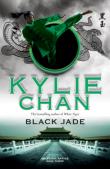 984234766987299761.png
984234766987299761.png
 984234766987299761.png
984234766987299761.png
'The epic conclusion to the Celestial Battle trilogy from the bestselling author of WHITE TIGER.
'With the palace under the sea destroyed, the eastern palace plagued by a swarm of insects and humanity decimated by by a combination of climate change, disease and war, Emma and John (Xuan Wu) don't have much time to think about their upcoming wedding.
'All romantic thoughts are pushed aside as they battle the Demon King a final time, try to eradicate the threat to earth and find their friends and loved ones. Once this is achieved, they can live happily ever after ... can't they?
'Full of exciting battles, diverse characters and sassy, witty dialogue, this is the third and final instalment in the Celestial Battle trilogy.' (Publication summary)
Author's note:
Gentle Reader, this is the ninth book in this story. Although you can choose to start here, you may find it more rewarding to read the story from the beginning with the first novel, White Tiger.
In response to readers' requests I've added a list of characters at the end.
Author's note:
Note for parents/teachers
My books are sometimes shelved as 'Young Adult'. This novel contains adult themes that a less mature reader may find disturbing. Parental discretion is advised.
'The cultural and commercial operations of the publishing industry have been dramatically reshaped by digital technologies, yet little is known about how these effects are differentiated across sectors of the industry. This article analyses data about the production of Australian-authored fantasy, romance and crime fiction titles to explore the specific publishing ecosystems of different genres and the roles played by multinational, small press and self-publishing in each. First, we show that there has been across-the-board growth in each genre and for each type of publisher. Second, we argue that multinational publishing activity in these genres has been characterized by broad stability, punctuated by experimentation with genre-specific imprints for romance and fantasy titles. Third, we find that small presses make diverse contributions to genre ecosystems, able to both activate prestige and experiment with formats. Finally, we note the immense growth in self-publishing, particularly in romance, and argue that self-publishing now operates in tandem with traditional publishing to create hybridized publishing ecosystems - with greater potential to transform the traditional publishing model than e-books.' (Publication abstract)
'The cultural and commercial operations of the publishing industry have been dramatically reshaped by digital technologies, yet little is known about how these effects are differentiated across sectors of the industry. This article analyses data about the production of Australian-authored fantasy, romance and crime fiction titles to explore the specific publishing ecosystems of different genres and the roles played by multinational, small press and self-publishing in each. First, we show that there has been across-the-board growth in each genre and for each type of publisher. Second, we argue that multinational publishing activity in these genres has been characterized by broad stability, punctuated by experimentation with genre-specific imprints for romance and fantasy titles. Third, we find that small presses make diverse contributions to genre ecosystems, able to both activate prestige and experiment with formats. Finally, we note the immense growth in self-publishing, particularly in romance, and argue that self-publishing now operates in tandem with traditional publishing to create hybridized publishing ecosystems - with greater potential to transform the traditional publishing model than e-books.' (Publication abstract)